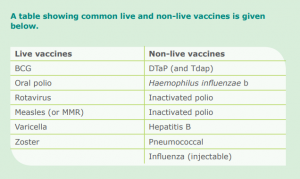Vaccines work
Vaccines are widely acknowledged to be the most successful medical advance ever. Vaccines continue to save hundreds of thousands of lives annually. History is full of descriptions of the devastation wrought on populations by infectious diseases before the age of vaccination. Huge numbers were killed by diseases like measles and smallpox, and hundreds of thousands left paralyzed by polio.
Huge strides have been made in combating diseases such as polio, tuberculosis, measles, diphtheria, pertussis and tetanus using vaccination. Many of these diseases are now uncommon, and mothers today may have never even heard of friends who have lost children due to illnesses like measles or diphtheria.
The success of vaccines may therefore lead to complacency and a false sense of comfort, unless we remember the devastation that these diseases caused in years gone by.
In some areas of Africa, it was customary for mothers not to name their babies until the measles season had passed, for fear they would not live through the season. Such fear of measles is no longer with us, and yet it is only by a continued sense of urgency that we can ensure that vaccine-preventable diseases do not return.
In South Africa, newer vaccines have been introduced as they have been developed, allowing protection against Haemophilus influenza type b, Streptococcus pneumoniae, hepatitis B, human papillomavirus and rotavirus. These vaccines are making a large impact on the health of South African children. We hope to see even more vaccines developed and implemented in the years to come.
You may be a parent and have some concerns with regards to vaccinating your child, here are a few frequently asked questions about vaccines;
Vaccine Common Questions
- Are Vaccines safe?
Yes, vaccines are very safe. Vaccines are more studied for safety than any other medication.
- What are the possible side effects of vaccines?
Like all medication, it is possible for a vaccine to cause side-effects. For the most part these are minor (for example, a sore arm or low-grade fever) and go away within a few days. Remember, vaccines are continually monitored for safety and are used to immunize millions of children in every country in the world each year. The decision not to immunize a child also involves risk and could put the child and others who come into contact with him or her at risk of contracting a potentially deadly disease.
- How do vaccines work?
The process of vaccination involves giving a person small, harmless amounts of an infectious agent (for example a virus) in order for the immune system to see it and prepare itself for the next time it meets the same infectious agent. Some vaccines are weakened forms of live infectious agents (called live attenuated vaccines) and some are inactivated parts of the infectious agent.
- What are the risks of not vaccinating?
The diseases vaccines prevent can be dangerous, or even deadly. Statistically, the chances of your child getting diseases such as measles, pertussis, or another vaccine-preventable disease might be low, and your child might never need the protection vaccines offer. However, you don’t want them to be lacking the protection vaccines provide if they ever do need it. Vaccination is the best way to protect your child from unpredictable side effects of serious infectious diseases. Vaccination protects your child, and children in your community.
- What diseases do vaccines prevent?
Vaccines are available for these dangerous or deadly diseases. Over the years, these vaccines have prevented countless cases of disease and saved millions of lives.
- Chickenpox (Varicella)
- Diphtheria
- Flu (Influenza)
- Hepatitis A
- Hepatitis B
- Hib (Haemophilus influenzaetype b)
- Measles
- Meningococcal
- Mumps
- Pneumococcal
- Polio (Poliomyelitis)
- Rotavirus
- Rubella (German Measles)
- Tetanus (Lockjaw)
- Whooping Cough (Pertussis )
- Can I wait and vaccinate my child when they are a bit older?
Children under 5 are especially susceptible to disease because their immune systems have not built up the necessary defences to fight infection. By immunizing on time (by age 2), you can protect your child from disease and also protect others at school or daycare.
- Are vaccines safe in pregnancy?
The overriding principle is that for pregnant women, live vaccines should be avoided but non-live (inactivated) vaccines can be given. For specialist advice for particular medical conditions, please consult a doctor. Certain vaccines are particularly recommended for pregnant women, such as influenza vaccines and Tdap-IPV (tetanus, adult dose diphtheria, acelluar pertussis and IPV vaccine).
- My child has a weakened immune system (immune-compromised) – can he be vaccinated?
The principle is that for people with weak immune systems such as those born with immune deficiencies, or those recovering from cancer or taking medication which dampens down their immune system, live vaccines should be avoided but non-live (inactivated) vaccines can be given. In fact, the non-live vaccines become even more important to protect the person from possible future infections.
It is possible that the immune response to vaccines may not be as strong as in a healthy person and the child may need re-vaccination once they are fully recovered. It is also important to check that all other children AND adults in the household have been vaccinated, in order to protect the child from catching diseases from them.
If household members require vaccination, inactivated vaccines should be given but a doctor should advise regarding whether live vaccines can be given to the household members. Some live vaccines given to household members may prove a risk to a child with a severely weakened immune system. See table 1 below for list of common live and non-live vaccines.

Prevention is always better than cure. Vaccines are the best prevention we can offer our children against infectious diseases – let’s make vaccine-preventable disease a distant memory for our children’s generation. Read more on vaccines here
Dr Melinda Suchard Head, Centre for Vaccines and Immunology National Institute for Communicable Diseases


